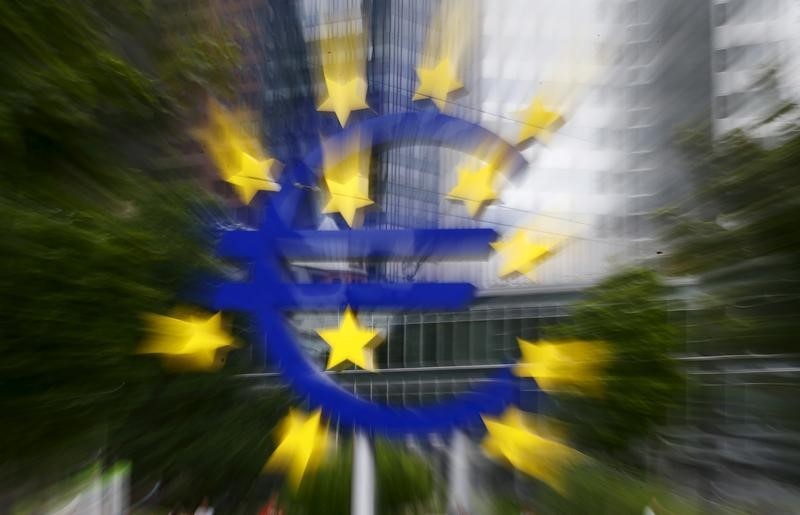By John Geddie and Jemima Kelly
LONDON (Reuters) - Frexit, Grexit or jitters about Quitaly - existential threats to the euro are remote but investors are still looking for clever ways to protect themselves against the risk of a euro dropout.
Pricing in arcane reaches of bond markets and elsewhere shows investors are not taking chances.
Headlines have focused on France, where far-right candidate Marine Le Pen has promised to take France out of the euro zone in the event she surprises and wins the presidential election.
Kokou Agbo Bloua, global head of flow strategy and solutions at Societe Generale (PA:SOGN) in London said there had been a "huge increase" from clients in ways to protect against political risk ahead of the French elections.
There are also renewed worries that the Greek crisis is about to rise up again and that Italy could see anti-euro politicians come to the fore in the next few years.
But traditional havens against such risk -- German bonds or the Swiss franc -- are already expensive, forcing investors to consider more inventive hedging alternatives. Here are a few:
1. Buy bonds linked to French inflation
A senior bonds trader at one of the world's biggest investment banks said he was advising clients to buy bonds linked to domestic inflation in countries seen at risk of leaving the euro zone.
If a country like France abandoned the euro, its new currency would probably devalue, he said, asking not to be named. That would boost consumer prices and, with that, returns on bonds linked to inflation.
2. Check your CACs and your CDS.
As most French government bonds are governed by national law, redenomination should not trigger a default. However, many investors remain fixated on the details of bond contracts.
Strategists at ABN AMRO (AS:ABNd) said bonds with collective action clauses (CACs), which require a super-majority of investors to approve any changes to the debt, are in demand. CACs were inserted into all euro zone government bonds from 2013.
Such bonds have been outperforming others since last autumn, senior rates strategist Kim Liu said.
Similar price performances have appeared in the credit default swaps (CDS) market, where investors buy insurance against a country defaulting on its debt. CDS contracts drawn up since 2014 are seen as more likely to pay out in the event of redenomination than older ones.
3. Calendar spreads around French elections
One favored strategy is playing calendar spreads in the options market. This involves selling shorter-dated puts expiring in March or April, and buying longer-dated puts expiring in May and June.
A put option gives the option-holder the right, but not the obligation, to sell the underlying asset at a specified time in the future. The calendar-spread strategy effectively offers the investor protection around the election.
"Clients are doing this on French government bonds, the euro, and in credit," , Societe Generale's Agbo Bloua said.
4. Buy euro and Swiss franc volatility
According to think tank World Economics, the euro is 6 percent overvalued for France, so a "Frexit" would probably trigger an initial depreciation.
A favored hedge among currency traders is to buy euro/dollar implied volatility via options protecting them against big price swings around the vote. Three-month implied volatility rose to match its highest levels since the aftermath of the Brexit vote in late February
Three-month implied volatility on the euro against the Swiss franc also jumped to its highest levels since Brexit last month
5. Buy Danish crowns
Currency traders are also seeking shelter in less traditional places, with Denmark -- among a handful of countries with a triple-A credit rating, and with a large surplus in its balance of payments -- seen as providing a safe alternative.
Denmark's central bank was forced last month to defend its currency peg against the euro with the biggest intervention since Brexit, as investors the crown to an eight-month high (EURDKK=D3).[L5N1GF5XN]
6. Buy long-dated puts on bank shares
Since the euro zone debt crisis, shares of the region's banks have become the instruments of choice for equity investors to express a macro view on the broader market.
Banks in Europe, which account for a much greater proportion of lending activity than their U.S. peers, are closely linked to the economic cycle. Shares are large and liquid enough to trade in and out of easily.
In both of last year's major political events in Europe -- the Brexit vote and the Italian referendum -- bank stocks were the most heavily traded and most volatile.
With global equity markets rallying to new highs and measures of volatility near record lows, options are cheaply priced. For investors looking to hedge against break-up risks, writing long-dated puts on euro zone banking shares could provide protection.
